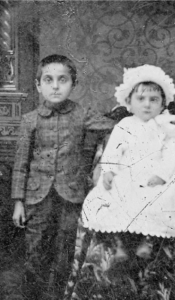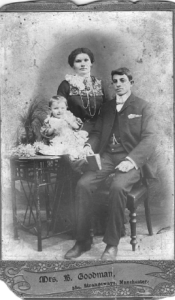Getting Started
There are dozens of how-to guides online that will help you to start your research. One that is helpful and succinct is provided by The Center for Jewish History Online Help Guide.
“Genealogy is the pursuit of information about your ancestors. Family history research goes beyond simply tracing family lines — gathering names, dates, and places — to discovering how our ancestors’ experiences were affected by the times in which they lived.
The most basic principle of family history research is to use the facts you know about your family history and work backwards, looking for documents and artifacts that reveal more information and bring to life the bare outline of your family tree.”












A Step by Step Guide
(Excerpted from Genealogy Guide: Getting started with your Family History Research at The Center for Jewish History: https://libguides.cjh.org/genealogyguides/getting_started
Interview your relatives.
First conduct interviews, asking elderly relatives for stories and information about their families and their childhoods. Take notes while you record the interviews on audiotape or videotape. Listen to the interviews again or create transcripts, writing down relevant information. Interview anyone who might be helpful—not just grandparents and parents, but collateral relatives like aunts, uncles, and cousins. The Center for Jewish History’s Ackman & Ziff Family Genealogy Institute has a how-to guide on interviewing your relatives.
Gather documents.
Ask your relatives if they have any documents, such as citizenship papers, marriage licenses, or birth and death certificates, that may contain further clues. Ask about other kinds of artifacts that may have been handed down across the generations: photographs, prayer books, wedding invitations, birth announcements, school report cards, diplomas, military discharge papers, etc. [NOTE: Take care to preserve valuable documents in archival-quality, acid-free paper or plastic!]
Organize your information.
Begin making a family tree using standardized forms (you may download and print this form) or genealogy software on your computer. Remember to record the source of each piece of information you find.
Orient yourself to the research process.
Read the Genealogy Institute’s research guides. For more in-depth explanations, consult the reference books in the Genealogy Institute collection.
Search online databases for U.S. records*:
Search Online
- Vital records (birth, marriage, and death certificates)
- Federal and State census returns
- Naturalization papers (declarations of intention, petitions, certificates)
- Passenger arrival records
- New York Times and other online newspaper indexes (articles and obituaries)
- Social Security Death Index
- Cemetery records
- City directories (residential and business directories)
- Military records (draft registration cards, enlistment records)
* Many U.S. records can be located on free websites (see resources listed on general resource link on this JGS website)
Remember to join your local Jewish genealogical society for further help, and always remember to take careful notes and document all your sources!
Once you have the basics down, you will begin to learn the challenges that are unique to Jewish genealogy in searching for your ancestors: Jewish migration history, changing European borders and governance, Jewish names and how they changed, and the Holocaust, among others.
